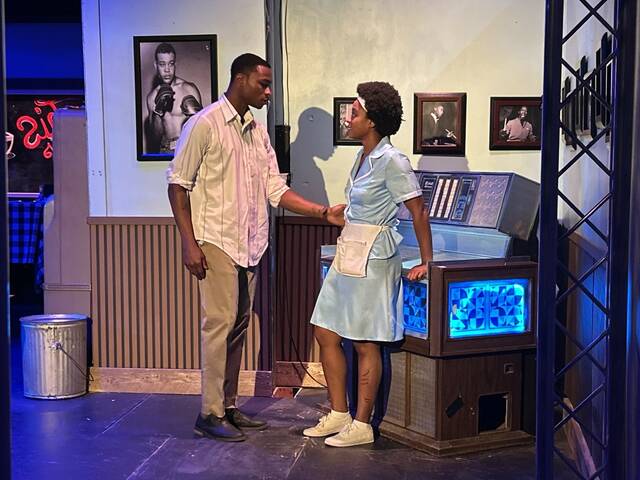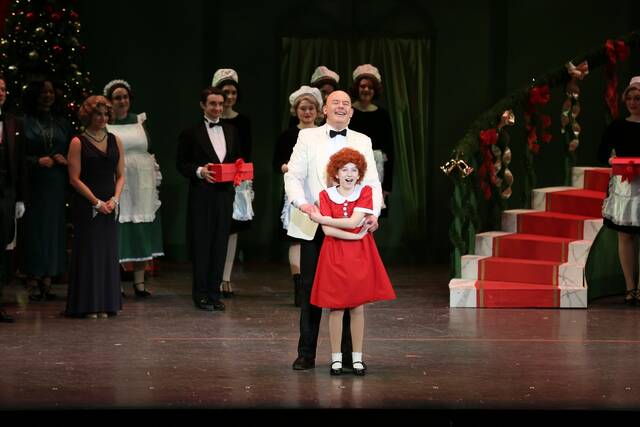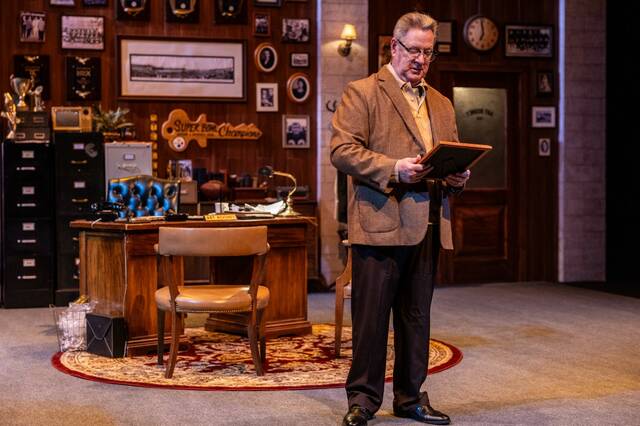Continuing a winning streak with their August Wilson’s American Century Cycle Experience, Pittsburgh Playwrights’ production of “Two Trains Running” takes the audience on a fantastic ride — and marks a milestone.
Playwrights has shown a long-standing dedication to producing Wilson’s work. As of this production, they have now twice completed staging his Century Cycle, which is the collection of 10 plays he wrote exploring the Black experience in America during the 20th century, with one play taking place in each decade.
It’s a bit surprising that “Two Trains Running” is not one of the more well-known of these works, considering its setting during the historically crucial 1960s, both for the United States and for Pittsburgh’s Hill District. It was first performed on Broadway in 1992, earning Laurence Fishburne a Tony Award for best featured actor in a play.
At Thursday night’s performance at the Madison Arts Center in the Hill District, the audience was enthralled.
As with Playwrights’ recent production of “Fences” — which I reviewed earlier this week — there is a strong sense of place to “Two Trains,” which takes place entirely within a Hill District diner. Familiar locations including Centre Avenue, Wylie Avenue, the Monongahela River and East Liberty (correctly pronounced ‘Sliberty by the characters) dot the script.
Who knows? Theatergoers will possibly encounter some of those locations on their way to see this play.
The diner’s owner is Memphis Lee (Art Terry). Forced to flee north from the land he owned in the Jim Crow South in the 1930s, Memphis is facing the steamroll of urban renewal; the city intends to demolish the buildings on the diner’s block. But he’s standing firm, requiring a price of $25,000 from the city for the building, a sum that he feels he’s owed, so that he can return to Mississippi and right the injustices done to him there.
In addition to negotiating with the city, Memphis is at odds with West (Sheldon Ingram), a highly succesful funeral director and business owner who continues to offer to buy Memphis’ building for a reduced price. Throughout the course of the play, West is dealing with the funeral and burial of community religious leader Prophet Samuel. Ingram is a commanding presence with bang-on mannerisms and a knack for realistic reactions.
The audience observes the comings and goings of other diner patrons, including the hilarious and superstitious Holloway, played by Wali Jamal, who stepped in at the last minute and was a shining light in the show. Holloway encourages everyone to seek the wisdom of a woman named Aunt Ester, an ancestral connection for the community.
Then there’s numbers-runner Wolf (Boykin Anthony), an almost constant presence in the diner. Anthony’s performance is often intense and certainly memorable, especially in scenes with Terry’s Memphis and the young ex-con firecracker Sterling (Manny Walker). Sterling is a representative of a different attitude when it comes to dealing with systemic racism, acting as the foil to Memphis. While Memphis works within the system to try to get ahead, Sterling goes out and takes it. Walker plays the character with a fiery passion, especially during the (almost literal) mic drop moment right at the play’s end.
Sterling is also passionate about Risa (Amira Jackson), the omnipresent cook and waitress at the diner who speaks rarely but packs a giant wallop when she does. Risa is both aloof and fierce, and Jackson perfectly plays her stoicism and her emotional outbursts.
Speaking of outbursts, perhaps the most interesting character in the play is Hambone (Loaf Thomas). Despite almost exclusively saying the same sentence throughout — “I want my ham!” — Thomas’s power makes Hambone indelible in the minds of both his fellow characters and the audience. He was cheated out of payment in the form of a ham from the meat shop owner across from the diner for painting a fence almost a decade before. His fixation and plight is representative of the general desperation and frustration of the characters and is deeply affecting to the others at the diner.
“Two Trains Running” is a relatively simple production, but director and scenic designer Mark Clayton Southers (also the founder, producing artistic and technical director of Pittsburgh Playwrights) did an impeccable job. The cast’s movement around the stage provides both intimacy and tension. In a second act confrontation between Wolf and Sterling over a payout, the crackling intensity was palpable through the audience. And Risa’s constant movement, sweeping and wiping, is as much a part of the scenery as the checkered tablecloths.
The authentic diner feels lived-in down to the Allegheny County Health Department 1969 sticker by the door. Thanks to sound design by Wayne Gaines, the old-timey phone rings, vintage jukebox noises and distant sirens add extra immersion (also I want the playlist they used before the show and between scenes; so much Stevie Wonder and Sam Cooke!).
Another standout was Latrice Lovett’s lighting design. Subtle touches — dimming the the stage and brightening up on Memphis during an introspective monologue at the end of Act One — added important atmosphere.
In the program’s directors note, Southers wrote, “It’s always an honor to work on August Wilson’s plays. We not only honor him by delving into his scripts and staging them, but for all involved it’s a great learning experience through his magnificent storytelling and his ability to take all involved on a journey through America’s landscape and Black culture, something that was not afforded to my generation through the traditional education system.”
This education is especially potent in “Two Trains Running,” which is not only entertaining but a compelling study in figures steeped in the history of the Hill District, the Civil Rights Movement, the history of urban renewal and eminent domain, and the Great Migration. As always, Wilson’s words are a brilliant starting point, and Pittsburgh Playwrights brings them to vivid life.
Pittsburgh Playwrights’ “Two Trains Running” runs through Aug. 30 at the Madison Arts Center in the Hill District. For tickets, visit pghplaywrights.org.








